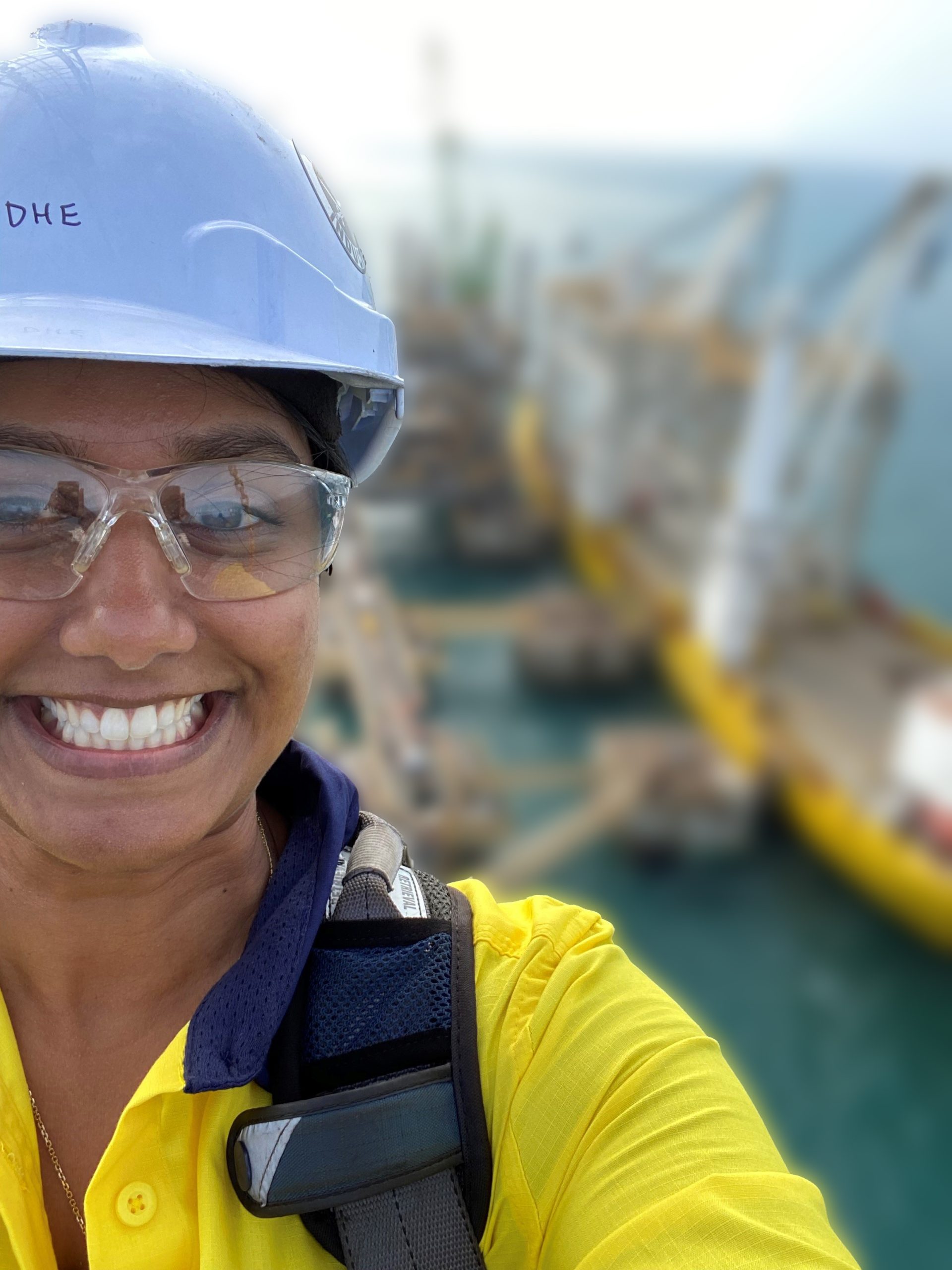
Have you ever wondered what it would be like to work on a Marine Project? We sat down with Dheavini Naicker, our Senior Project Engineer, who embraced the challenges and thrived in a dynamic environment. From her early passion for the environment to her unexpected discovery of engineering, Dhe's journey is an inspiring testament. Join us as she shares her experiences, accomplishments, and invaluable insights for aspiring female engineers interested in pursuing a career in the industry.
When and how did you realise you wanted to become an engineer?
I have always been interested in the environment and wanted a career that would balance indoor and outdoor work. For a long time, I envisioned becoming a Game Ranger, especially growing up in South Africa. When my family and I moved to Australia in 2005, I found myself placed in a graphics class, and that's when I first heard about engineering. In Grade 10, when I started studying Physics and Engineering, I knew this was something I wanted to pursue.
As a Senior Project Engineer at CaSE, you had the opportunity to work on a Marine Project. Could you describe your role, main responsibilities, and daily tasks during this project?
My role on this project included ensuring that all construction activities undertaken by the Jack Up Barge (JUB) barge crew were planned, materials were procured and delivered to the site, and marine logistics were in place for materials delivery to the barge, usually via tug and floating barge. I also handled lift planning, including approvals for the tower crane on the JUB, and the positioning of the JUB. The positioning involved various marine logistical elements and marine engineering principles, all of which were new to me but presented an exciting challenge.
Being a female engineer on board was sometimes challenging, as I was often the only woman on board. I found that I had to work hard to earn the respect and trust of the crew. My role required me to work closely with the Supervisor to ensure that all activities proceeded as smoothly as possible, given the typical challenges in construction. Going through the planning process with the Supervisor helped us forge a closer relationship, and we always had each other's backs.
How did you prepare yourself for working in a demanding and challenging offshore environment like a barge?
Every morning, we would arrive on-site around 5:15 a.m. for our Engineers and Supervisors meeting at 5:30 a.m. Despite not being a morning person, the breathtaking sunrises on the way to work or before our meeting helped me start the day with an appreciation for the environment, we were working in. It's not often that your office door opens to the most beautiful view of the ocean. Another critical aspect of adapting to this environment was understanding that everyone on board had more experience than I did. Treating everyone with the respect they deserved helped me gain their respect in return.
Could you share a memorable experience or accomplishment that you've had while working on this project?
There were several career milestones for me on this project, but one of the most memorable ones was planning, procuring, and implementing the heaviest lift of my career (so far!). Refining the lift plan to meet the crew's expectations and the requirements of the lift reviewer taught me a lot. I was able to procure a lightweight sling that met industry requirements for the lift while minimising manual handling risks for the crew. The lift went off without a hitch, and both the crew and management team were delighted with our efforts towards this successful outcome.
What are some of the technical skills and knowledge required that you believe made you qualified for this role?
The project management skills I had learned over the years were key to my success in this role. Soft skills such as communication, problem-solving, adaptability, and organisation formed the basis of my daily tasks. When I lacked technical skills, I was not hesitant to seek help, and there were always people willing to assist, just as I was when my colleagues needed help. While I did rely on my technical skills, such as understanding plant and equipment, lift planning, and logistical planning, I felt that my project management soft skills played a more substantial role.
During this project, how did you manage the demands of working in a maritime setting with your personal life?
For me, the demands on my personal life primarily stemmed from a FIFO (Fly-In-Fly-Out) perspective. I had never worked on a proper FIFO roster before, and I had only been married for six months before the project, which made married life a little tricky. I realise how much I appreciated spending time with friends and family even more when I was back on my Rest and Recreation (RnR). However, both my husband and I felt lonely at times while I was away.
What's your best memory of this project and why?
Once again, there were so many amazing memories, but one of the best was when we had whales visit us right next to the barge!
What advice would you give to other aspiring female engineers interested in pursuing a career in the industry?
Being an engineer has been incredibly fulfilling for me. Seeing something you've planned and executed being built and used is a great feeling. My advice would be to follow your passion and let it guide you. People can see that passion and are drawn to it. It will also help you remain open to learning new things and continuously improving yourself. If you love what you do, you'll never work a day in life. I've had hard days that felt endless, but for the most part, I absolutely love what I do, and I'm grateful for the opportunity. Also, don't ever feel like you need to change yourself to fit in with the men; let them fit in with you!